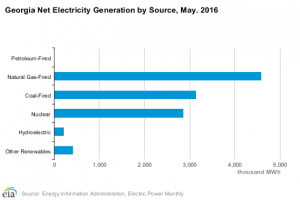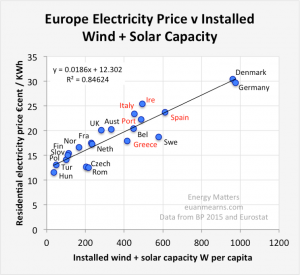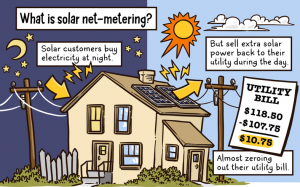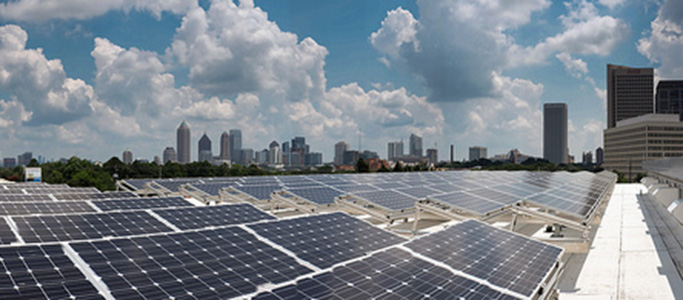This article originally appeared in the Fall 2016 edition of the Georgia Political Review.
Georgia is going green – at your power bill’s expense. In late July, the Public Service Commission, Georgia’s regulatory tribunal for utilities, approved Georgia Power’s plan to generate 1,600 megawatts of renewable energy by 2021. According to EIA data, that’s enough to power 264,000 homes and satisfy over 10 percent of the state’s energy. That’s an ambitious goal, given that solar, biomass and hydroelectric sources make up very little of the state’s electricity generation today. The plan was hailed as a big step forward by conservationists like the Southern Alliance for Clean Energy and the Georgia Climate Change Coalition. However, organizations on the right, such as Americans for Prosperity and Georgia Public Policy Foundation, have fought hard against the Commission’s decision. They claim that the regulatory agency is betraying its true mission of protecting the public interest by promoting policies that will raise energy costs for consumers.

The motives of these conservative groups have been called into question by watchdog organizations. A report by the Energy and Policy Institute reveals that some of the groups are funded by a combination of utility interests, oil and gas companies, and the Koch brothers, casting doubt over the accuracy of their research. However, there is conclusive evidence from independent researchers that reveals there are, in fact, hidden costs of renewable energy policies. New installations for large-scale renewable power require massive amounts of capital and often carry external costs such as grid and systems upgrades. Utility companies often pay higher costs for solar and wind energy due to high transmission costs and disruptions from localized weather events.
There’s data to back this up: states that have implemented mandatory renewable requirements have seen rates increase by an average of 54.2 percent, and rising electricity costs in European countries have been tied to development of large renewable projects. Unfortunately, high costs will be a barrier that discourages further renewable development. Rising electricity prices has led to backlash against renewable energy in states such as Oklahoma, Ohio and Kansas. Given that low electricity prices are incredibly important for economic growth across a variety of industries, support for green energy will be determined by the government’s ability to mitigate the costs households and business will face.

Absent policy changes, Georgia’s turn to renewables is unlikely to last. The state’s current regulatory scheme to promote renewable energy is severely inadequate. Georgia Power has been soliciting bids for solar power plants since 2013 at a variety of rates, but no projects have been completed yet. The state’s rooftop solar program was a failure. Despite fielding over 10,000 inquiries, only five customers have signed up. Georgia Power also has a voluntary program in which consumers can buy “blocks” of energy generated from biomass or solar panels. Consumers who want to participate pay a higher price for electricity to get 100kWh of green energy for a 12-month period. However, the higher electricity bills often deter otherwise environmentally friendly consumers from participating in the program.

Other governments have had great success with policy mechanisms that promote renewable sources while keeping electricity prices low. In California, consumers who install solar panels can sell their excess energy generation during the day back to the utility companies as part of a ‘net-metering’ policy, resulting in low utility costs. Georgia’s lack of a net-metering policy could be the reason its rooftop solar program was unsuccessful. Some European countries have taken this concept even further by introducing feed-in tariffs. These policies break the monopoly utility companies hold by paying consumers a premium rate for generating their own energy, resulting in decreased wholesale electricity prices. Carefully tailored government subsidies targeted at increasing purchases of solar panels or developing large renewable plants can also be successful at lowering investment costs.
Despite historical resistance against green energy in red states, there is a unique political coalition forming that might make policies such as feed-in tariffs and renewable energy incentives possible in states like Georgia. The environmental movement is joining hands with unlikely allies in the Tea Party to promote solar power in Georgia. The Democrats like these policies because they help reduce the impact of climate change, and Tea Partiers support them to promote free markets over big government in the energy sector. Prominent activists such as Debbie Dooley, co-founder of the Atlanta Tea Party, are taking on Americans for Prosperity to refute claims that decentralized generation will raise prices. Increased renewable energy generation is inevitable as the nation pushes to limit greenhouse gas emissions. The state must determine whether it wants to get ahead of the curve with common sense legislation to promote long term green growth, or suffer the costs of high energy prices and diminished economic growth.


